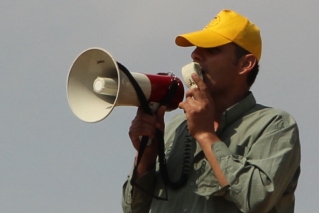 Muhammad Amirah. Photo by Sarit Michaeli, B'Tselem
Muhammad Amirah. Photo by Sarit Michaeli, B'TselemOn October 18, 2012, the Military Court in Ofer acquitted Muhammad Amirah, an activist in the Popular Committee of the Village of Ni’lin in the Ramallah District, on charges of incitement, aiding a terrorist organization, and interference with a soldier in the course of duty.
Amirah was arrested near the village of Deir Kaddis during a spontaneous nonviolent protest near the settlement of Nili, in which he sat down in front of a tractor and demanded the cessation of unauthorized road work on the village’s land (see further details below).
The military judge, Maj. Amir Dahan, held that the special defense for soldiers in the course of their duty does not apply if the soldier is acting illegally – including, for example, enforcing an action that is itself illegal. The judge ruled that the elements of the offense of incitement were not proven and criticized the use of the charge in this indictment, where the protest was against an illegal act of the Civil Administration.
The verdict in Amirah’s trial is a precedent-setting decision in light of its assertions that there is no obligation to comply with illegal orders issued by security forces, and that non-violent resistance against illegal activities of the security forces is legitimate.
Amirah was arrested near the village of Deir Kaddis during a spontaneous nonviolent protest against the Civil Administration’s unauthorized paving of an axis between two settlements across the village’s lands. Amirah sat down in front of a tractor and demanded that the road work cease. The Supreme Court subsequently ruled that Civil Administration’s road work was carried out in violation of the law of planning and construction (HCJ 5098/11).
In the ruling, as in the indictment, no violence of any kind was attributed to Amirah: he was accused of nothing more than lying on the ground and resisting arrest. The military judge Maj. Amir Dahan determined that these actions cannot be considered interference with a soldier during the course of his duty, since the soldiers did not act legally – they acted to support and defend illegal work. The judge even emphasized that the fact that the soldiers were not aware they were enforcing an illegal act does not make their actions legal.
With regard to the second charge, incitement, the judge ruled that the elements of the crime were not proven. Among other things, it was not proven that the defendant “clearly said things or took distinct actions intended to incite public disorder.” The judge doubted that a crowd of 15 people was enough to constitute a danger of breach of public order, especially in light of the fact that there were an equal number of security personnel on the premises. The ruling emphasized that the terms “breach of public order” and “public safety” are “troublesome to say the least and are not at all appropriate when the act in question is taking part in a protest and trying to stop illegal road works.”
Amirah was represented by Attorney Nery Ramati of the office of Attorney Gaby Lasky.
ACRI’s Position
This is an important decision. A military judge has ruled, in effect, that protesters in – and residents of – the West Bank are permitted to non-violently resist unlawful orders of soldiers, are not be viewed as having committed a crime, and are not to be punished for disobeying such orders. Another implication of the decision is that non-violent resistance to illegal actions of the security forces is legitimate, especially when residents’ rights to access the courts are hampered, and they are prevented from taking legal action to oppose such activities prior to the date of their execution.
However, the judge made clear, the verdict should not be interpreted to create “a right to resist any illegal action under zoning and building laws or other law.” Rather, the meaning of the holding is that a person who opposes an illegal act “will not be exposed after the fact to indictment for crimes intended to punish whoever disturbs the official authorities.”
It should be emphasized that the judge refrained in the ruling from dealing with the fundamental question of freedom of expression and demonstration, and limited the ruling to the narrow right to resist illegal actions of the security forces. The judge referenced Amirah’s actions and the violence directed by the soldiers against him in isolation from the wider context of the duty of the occupying power to allow freedom of expression and protect the right to demonstrate and protest in the occupied territory, regardless of the circumstances leading to the demonstration or protest. This obligation applies whether the reason for protest is the legal or illegal activity of the regime. In the West Bank this obligation is violated on a consistent basis.
Palestinian residents of the occupied territories have no access to, and no influence on, the centers of governance in the State of Israel. Under these circumstances, demonstrations are the primary way in which they can make their voices heard and protest against the violation of their rights. But military legislation and military policy deny Palestinians the right to demonstrate.
The silence of military judges on this important issue perpetuates the widespread denial of Palestinian residents’ of the West Bank right to demonstrate, leaving the security forces to arbitrarily decide whether any given demonstration is “appropriate” for violent dispersal.
To read the complete verdict (in Hebrew) click here.







